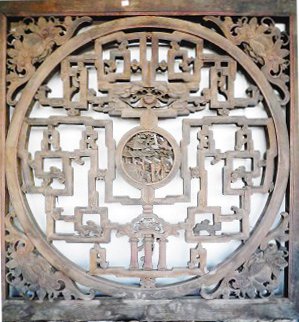A 200-year-old carved wooden window, described as a rare and exquisite treasure, was recently discovered in a small village flea market in China’s southwest Yunnan Province, according to an article in the Kunming Daily (昆明日报).
Mr. Yang Anning (杨安宁), a well-known expert in ancient Chinese architecture, described the well-preserved window as a “cultural heritage gem” having the distinctive artistic style of a Yunnan carved wooden window from the late Qing Dynasty (1644-1911).

The “theme” of the window, according to Mr. Yang, is “four happinesses surrounding longevity” (si fu peng shou 四福捧寿).
The intricate design within the large circle is actually a very stylized version of the Chinese character for “longevity” (shou 壽).
At each of the four corners of the window frame are bats with wings extended and heads facing the circle.
The Chinese love rebuses which are “visual puns”. In this case, the Chinese word for “bat” (fu 蝠) has exactly the same pronunciation as the word for “happiness” (fu 福).
Because “four bats” (si fu 四蝠) sounds like “four happinesses” (si fu 四福), there are “four happinesses surrounding longevity”.
The origin of the “four happinesses” is a poem by Hong Mai (洪迈 1123-1202) who was a scholar-official during the Southern Song Dynasty:
久旱逢甘雨, 他乡遇故知, 洞房花烛夜, 金榜题名时
- “Sweet rain after a long drought” (jiu han feng gan yu 久旱逢甘雨)
- “Meeting an old friend in a faraway place” (ta xiang yu gu zhi 他乡遇故知)
- “The wedding night” (“the night of lighting a candle in the bridal chamber”) (dong fang hua zhu ye 洞房花烛夜)
- “Having one’s name on the list of successful candidates of the imperial examination” (jin bang ti ming shi 金榜题名时)
The window also illustrates the “Five Happinesses” (wu fu 五福), sometimes translated as the “Five Blessings” or “Five Good Fortunes”, which comes from the very ancient “Classic of History” (shujing 书经) compiled during the Warring States Period (475 BC -221 BC).
The “Five Happinesses” consist of longevity (寿), wealth (富), health and composure (康宁), virtue (修好德), and the desire to die a natural death in old age (老终命).
You will notice that the character for “longevity”, which occupies the center of the window, is also one of the “Five Happinesses” (wu fu 五福).
Adding the “longevity” fu to the four fu represented by the bats makes a total of five fu thus symbolizing the “Five Happinesses”.
The window has an abundance of hidden meanings.
For example, the shape of the window expresses the ancient Chinese belief that heaven is round and the earth is square (tian yuan di fang 天圆地方) also known as the circle in a square.
As another example, the large circle resembles an old Chinese “cash” coin (qian 钱) which is round with a hole in the center.
The hole in the center of a Chinese coin is called the “eye” (yan 眼). Because the Chinese words for “before” (前) and “coin” (钱) are both pronounced qian, the window has the implied meaning of “happiness is before your eyes” (fu zai yan qian 福在眼前) (happiness (fu) = bats (fu); before (qian) = coin (qian); eye (yan) = hole in center of coin (yan)).
The newspaper article concludes with Mr. Yang revealing that the very detailed scene in the small circle at the center of the window has “visual puns” meaning:
- “May you have good fortune, longevity, and an abundance of blessings, years and offspring” (福寿三多 fu shou san duo)
- “A pair of dragons play with longevity” (双龙戏寿 shuang long xi shou)
- “Happiness falls from heaven” (喜从天降 xi cong tian jiang)
- “Wealth and honor again and again” (富贵连连 fu gui lian lian)
- “The plum blossoms with the Five Happinesses” (梅开五福 mei kai wu fu)
- “To add flowers to embroidery” (锦上添花 jin shang tian hua)
For a different artistic representation of the “four happinesses” please see “Four Happiness Boys“.
very interesting explanation!
Do you know the meaning of the complex symbol appearing in the Chinese piggy bank and made of the following symbols 王缶佳财召 covered by the deck radical and surrounded by the foot radical?
Hi Domenico Valle,
Are you referring to this character?
If yes, then this is a complex character for the expression zhao cai jin bao (招材进宝) which means “money and treasures will be plentiful”.
The character composed of 王缶 is an old way of writing the character bao (宝) meaning treasure.
Gary
What a fascinating description of an antique Chinese window. Thank you for sharing this! It is so lovely(and rare) to get so much detail and information online.